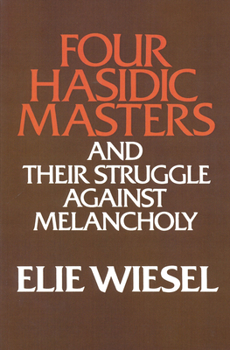Four Hasidic Masters and Their Struggle Against Melancholy
Select Format
Select Condition 
Book Overview
Portrays four charismatic leaders of the eighteenth and nineteenth-century Hasidic movement in Eastern Europe.
Format:Paperback
Language:English
ISBN:0268009473
ISBN13:9780268009472
Release Date:August 1978
Publisher:University of Notre Dame Press
Length:160 Pages
Weight:0.46 lbs.
Dimensions:0.4" x 5.3" x 8.0"
Customer Reviews
2 ratings
When Your Calling is to Heal Broken Hearts, Yours is at Risk
Published by Thriftbooks.com User , 15 years ago
I am no Rebbe, but my father's branch of the family is Chassidic. So I felt compelled to delve for years into the primary sources of this psychologically-minded approach to Judaism. It fascinated me and continues to. I have been fortunate to study under a Rebbe for years. In short, I know a bit about what Mr. Wiesel writes. My line of work is inpatient clinical psychology. I work with patients suffering from the most severe forms of mental illness. They are hospitalised because they are so tormented that they are suicidal and/or homicidal. Contrary to the popular stereotype, most of them are not "committed:" They arrive at the ER begging to be admitted. They want to live! In clinical psychology practise, I listen to, observe, and read about human suffering, that of my patients. It surrounds me all day, because my workplace is my patients' home for the time being. Usually, I am proud to be there to help; I feel that I do a good job, and the results of my work support my subjective self-assessment. However, healing a "broken heart," even with the advent of fMRI and other objective measures that assist me, will never be the same as setting a broken bone. Sometimes, the patient's pain is so great and so resistant to treatment that I have to truly fight so that it does not "infect" me. Because if it does and sets up shop in my mind, I am useless to my patients. In addition, I would become a shell of myself, with all of the ramifications. Stats tell us that suicide is most prevalent among clinical psychologists, psychiatrists, and police officers. I've left out a few, but the common denominator is clear: If the professional does not learn rapidly to be empathic and helpful yet capable of "not taking it home" with him/her, s/he's doomed. All professional clergy, particularly those who are tremendously adulated--often to their dismay--such as "Grand Rabbis" (Chassidic Rebbes, spiritual leaders of oft-thousands) are, I believe, at similar risk. Indeed, the Chassidic Rebbe is at an especially high risk of emotional collapse (and physical!), because he is "on-call" 24/7. There are no vacations, no sabbaticals, no conferences (in the traditional sense)...none of that. He must attend to a Chassid requesting advice no matter what's the matter. This can be euphoria-inducing in some (say, the Ba'al Shem Tov), who are elated by the solace they bring to so many tormented people. But, from my observations, which I would like to explore some day in a quantitative / scientific fashion, being needed so much for so many things sometimes leads the Rebbe to at the very least protracted battles against melancholia. Because no matter how hard you try, no matter how much you care, sometimes you just cannot help save someone's spirit, life, family, or all of the above. You are a mere human. Ask any clinical psychologist or psychiatrist: We remember our "first suicide" vividly for the rest of our lives. Those of us who survive and thrive are those who, in spite of the m
The Jewish dark night of the soul. A holy despair?
Published by Thriftbooks.com User , 19 years ago
Despair and depression are I guess , the mood of most people at one time or another of their lives. For some people however it is the dominant note, the prevailing feeling and totally takes over their lives. Why this happens and to whom exactly it happens whole Literatures, including my guess is the psychiatric and neuroscience literatures can give only partial answers to. However ' despair ' becomes especially problematic and interesting when it happens in the lives of those who are our spiritual models , and who in the Hasidic tradition are to continually be clinging to and uplifted by the Presence of God. How explain the fall and the darkness? Elie Wiesel tells the individual story of four great Hasidic masters and their particular struggles with their own inner darkness. My only Holy Teacher the late Dovid Hertzberg who loved these Hasidic masters with all his soul, and taught their Torahs with such love and inspiration once suggested ( And this is not his suggestion alone) that the great Kotzker went into his ten year period of isolation and solitude because the sufferings of his own Hasidim ( It was his task to listen to them and help them) became so great that they overwhelmed him completely i.e. The despair was not a private despair of an individual for himself but a despair which came out of his love of his own Hasidim and people. Perhaps, even a holy despair.





